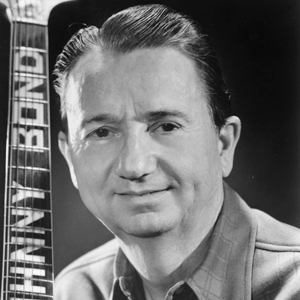During his long career, Johnny Bond wore a number of hats — actor, song
publisher, scriptwriter, humorist, author, singer and session musician — in
addition to being a top songwriter. He began his composing career writing
cowboy material, but later had success writing honky tonk tunes, novelty
numbers and drinking songs. In fact, his biggest chart hit as a recording
artist was his self-penned, humorous drinking song "10 Little Bottles," which
was a #2 country hit in 1965. He also added evergreen songs such as "I Wonder
Where You Are Tonight," "Cimarron," "Ten Years" and "Tomorrow Never Comes" to
the country canon.
He began his entertainment career playing for dances near his home in rural
Oklahoma. He moved to Oklahoma City, formed a singing-cowboy trio and began
broadcasting on radio. Gene Autry discovered the trio when he passed through on
tour and invited them to California to appear on his Melody Ranch CBS
network radio show.
Now known as the Jimmy Wakely Trio, the act appeared in a Roy Rogers film in
1939, then moved to Los Angeles in 1940 to take Autry up on his offer. Bond
subsequently did recording sessions with Autry and appeared in 38 films,
usually as a sidekick or an accompanying guitarist. He also became a member of
Tex Ritter's band, the Red River Valley Boys, on both stage and recordings. He
remained with Autry's Melody Ranch show until it ended in
1956.
Between 1952 and 1960, Johnny Bond was a regular on the California TV series
Town Hall Party. He was also its writer. He and Ritter formed the song-publishing company Vidor Music. Bond continued to work as a musician as well,
touring as a member of Autry's band. In Nashville, Bond, Ritter and Autry were
on the board of the Country Music Association in the 1960s when the
organization decided to build a Country Music Hall of Fame. He was elected to
the Nashville Songwriters Hall of Fame in 1970s and won the Academy of Country
Music's Pioneer award in 1974. Bond was elected to the Country Music Hall of
Fame in 1999. He wrote a biography of his friend Tex Ritter, published in 1976,
and memoirs of his own, titled Reflections, published the same year.
